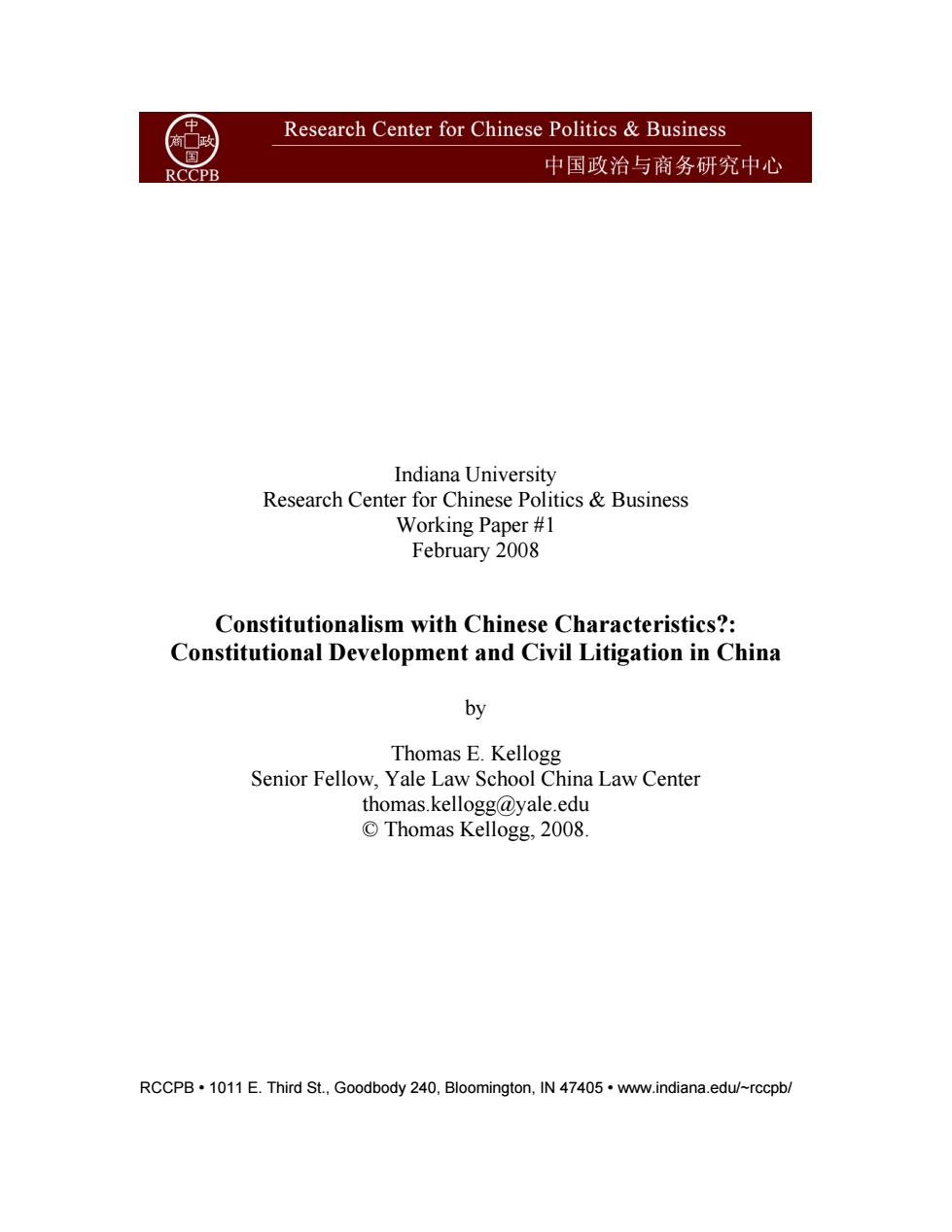
中 Research Center for Chinese Politics Business 商政 国 RCCPB 中国政治与商务研究中心 Indiana University Research Center for Chinese Politics Business Working Paper #1 February 2008 Constitutionalism with Chinese Characteristics?: Constitutional Development and Civil Litigation in China by Thomas E.Kellogg Senior Fellow,Yale Law School China Law Center thomas.kellogg@yale.edu Thomas Kellogg,2008. RCCPB.1011 E.Third St.,Goodbody 240,Bloomington,IN 47405.ww.indiana.edu/~rccpb/
Indiana University Research Center for Chinese Politics & Business Working Paper #1 February 2008 Constitutionalism with Chinese Characteristics?: Constitutional Development and Civil Litigation in China by Thomas E. Kellogg Senior Fellow, Yale Law School China Law Center thomas.kellogg@yale.edu © Thomas Kellogg, 2008. RCCPB • 1011 E. Third St., Goodbody 240, Bloomington, IN 47405 • www.indiana.edu/~rccpb/
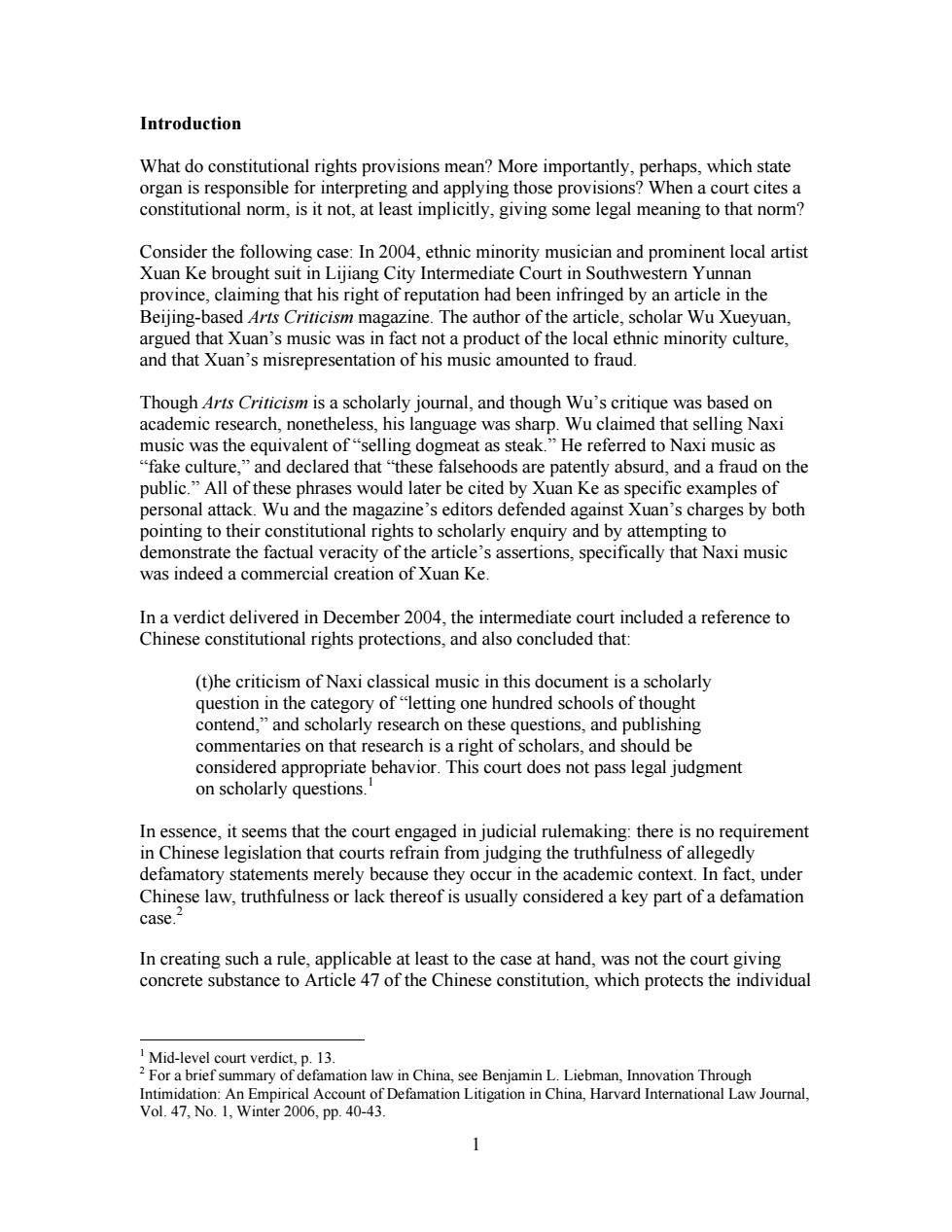
Introduction What do constitutional rights provisions mean?More importantly,perhaps,which state organ is responsible for interpreting and applying those provisions?When a court cites a constitutional norm,is it not,at least implicitly,giving some legal meaning to that norm? Consider the following case:In 2004,ethnic minority musician and prominent local artist Xuan Ke brought suit in Lijiang City Intermediate Court in Southwestern Yunnan province,claiming that his right of reputation had been infringed by an article in the Beijing-based Arts Criticism magazine.The author of the article,scholar Wu Xueyuan, argued that Xuan's music was in fact not a product of the local ethnic minority culture, and that Xuan's misrepresentation of his music amounted to fraud. Though Arts Criticism is a scholarly journal,and though Wu's critique was based on academic research,nonetheless,his language was sharp.Wu claimed that selling Naxi music was the equivalent of"selling dogmeat as steak."He referred to Naxi music as "fake culture,"and declared that"these falsehoods are patently absurd,and a fraud on the public."All of these phrases would later be cited by Xuan Ke as specific examples of personal attack.Wu and the magazine's editors defended against Xuan's charges by both pointing to their constitutional rights to scholarly enquiry and by attempting to demonstrate the factual veracity of the article's assertions,specifically that Naxi music was indeed a commercial creation of Xuan Ke. In a verdict delivered in December 2004,the intermediate court included a reference to Chinese constitutional rights protections,and also concluded that: (t)he criticism of Naxi classical music in this document is a scholarly question in the category of"letting one hundred schools of thought contend,"and scholarly research on these questions,and publishing commentaries on that research is a right of scholars,and should be considered appropriate behavior.This court does not pass legal judgment on scholarly questions. In essence,it seems that the court engaged in judicial rulemaking:there is no requirement in Chinese legislation that courts refrain from judging the truthfulness of allegedly defamatory statements merely because they occur in the academic context.In fact,under Chinese law,truthfulness or lack thereof is usually considered a key part of a defamation case.2 In creating such a rule,applicable at least to the case at hand,was not the court giving concrete substance to Article 47 of the Chinese constitution,which protects the individual Mid-level court verdict,p.13. 2 For a brief summary of defamation law in China,see Benjamin L.Liebman,Innovation Through Intimidation:An Empirical Account of Defamation Litigation in China,Harvard International Law Journal. Vol.47,No.1,Winter 2006,pp.40-43. 1
1 Introduction What do constitutional rights provisions mean? More importantly, perhaps, which state organ is responsible for interpreting and applying those provisions? When a court cites a constitutional norm, is it not, at least implicitly, giving some legal meaning to that norm? Consider the following case: In 2004, ethnic minority musician and prominent local artist Xuan Ke brought suit in Lijiang City Intermediate Court in Southwestern Yunnan province, claiming that his right of reputation had been infringed by an article in the Beijing-based Arts Criticism magazine. The author of the article, scholar Wu Xueyuan, argued that Xuan’s music was in fact not a product of the local ethnic minority culture, and that Xuan’s misrepresentation of his music amounted to fraud. Though Arts Criticism is a scholarly journal, and though Wu’s critique was based on academic research, nonetheless, his language was sharp. Wu claimed that selling Naxi music was the equivalent of “selling dogmeat as steak.” He referred to Naxi music as “fake culture,” and declared that “these falsehoods are patently absurd, and a fraud on the public.” All of these phrases would later be cited by Xuan Ke as specific examples of personal attack. Wu and the magazine’s editors defended against Xuan’s charges by both pointing to their constitutional rights to scholarly enquiry and by attempting to demonstrate the factual veracity of the article’s assertions, specifically that Naxi music was indeed a commercial creation of Xuan Ke. In a verdict delivered in December 2004, the intermediate court included a reference to Chinese constitutional rights protections, and also concluded that: (t)he criticism of Naxi classical music in this document is a scholarly question in the category of “letting one hundred schools of thought contend,” and scholarly research on these questions, and publishing commentaries on that research is a right of scholars, and should be considered appropriate behavior. This court does not pass legal judgment on scholarly questions.1 In essence, it seems that the court engaged in judicial rulemaking: there is no requirement in Chinese legislation that courts refrain from judging the truthfulness of allegedly defamatory statements merely because they occur in the academic context. In fact, under Chinese law, truthfulness or lack thereof is usually considered a key part of a defamation case.2 In creating such a rule, applicable at least to the case at hand, was not the court giving concrete substance to Article 47 of the Chinese constitution, which protects the individual 1 Mid-level court verdict, p. 13. 2 For a brief summary of defamation law in China, see Benjamin L. Liebman, Innovation Through Intimidation: An Empirical Account of Defamation Litigation in China, Harvard International Law Journal, Vol. 47, No. 1, Winter 2006, pp. 40-43
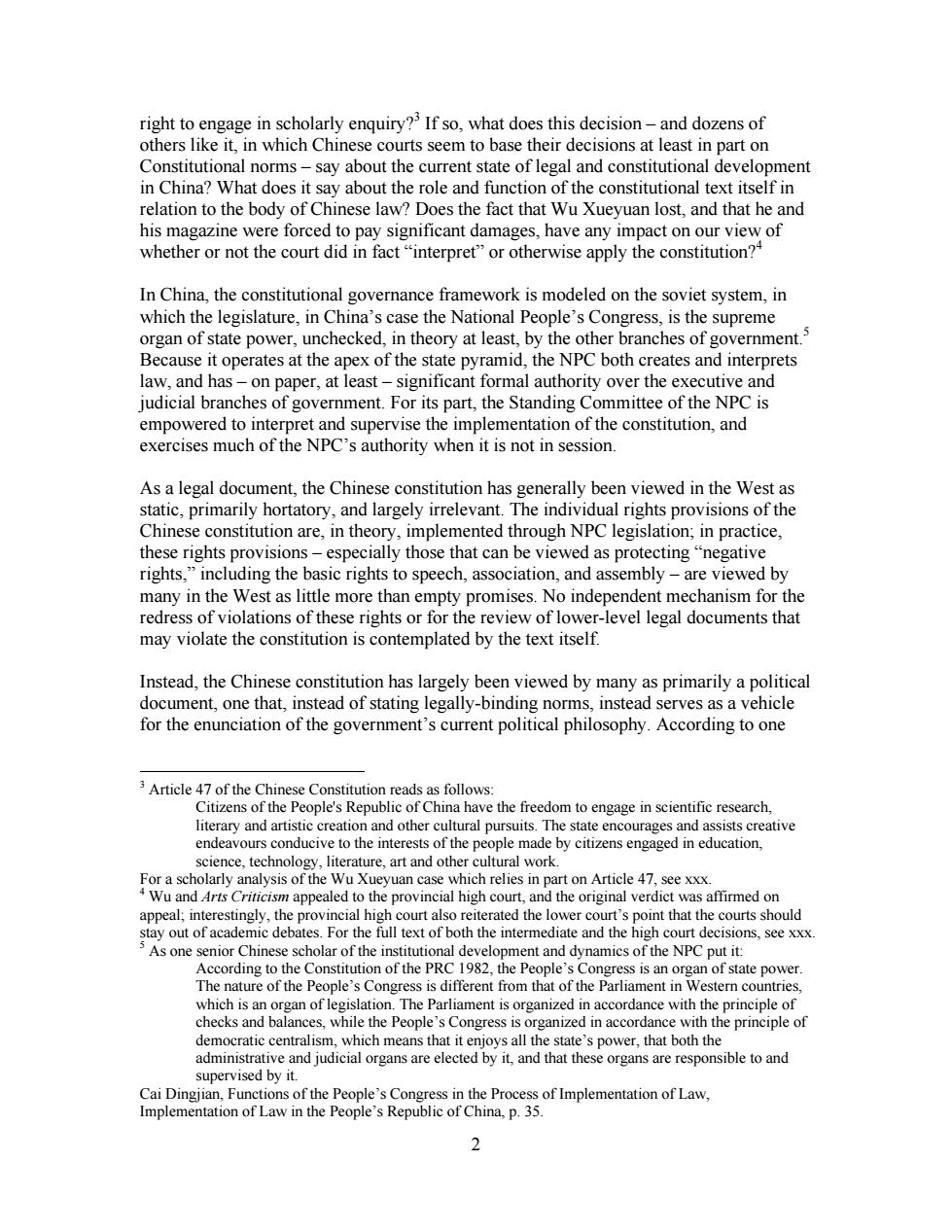
right to engage in scholarly enquiry?If so,what does this decision-and dozens of others like it,in which Chinese courts seem to base their decisions at least in part on Constitutional norms-say about the current state of legal and constitutional development in China?What does it say about the role and function of the constitutional text itself in relation to the body of Chinese law?Does the fact that Wu Xueyuan lost,and that he and his magazine were forced to pay significant damages,have any impact on our view of whether or not the court did in fact"interpret"or otherwise apply the constitution? In China,the constitutional governance framework is modeled on the soviet system,in which the legislature,in China's case the National People's Congress,is the supreme organ of state power,unchecked,in theory at least,by the other branches of government.5 Because it operates at the apex of the state pyramid,the NPC both creates and interprets law,and has-on paper,at least-significant formal authority over the executive and judicial branches of government.For its part,the Standing Committee of the NPC is empowered to interpret and supervise the implementation of the constitution,and exercises much of the NPC's authority when it is not in session. As a legal document,the Chinese constitution has generally been viewed in the West as static,primarily hortatory,and largely irrelevant.The individual rights provisions of the Chinese constitution are,in theory,implemented through NPC legislation;in practice, these rights provisions-especially those that can be viewed as protecting "negative rights,"including the basic rights to speech,association,and assembly-are viewed by many in the West as little more than empty promises.No independent mechanism for the redress of violations of these rights or for the review of lower-level legal documents that may violate the constitution is contemplated by the text itself. Instead,the Chinese constitution has largely been viewed by many as primarily a political document,one that,instead of stating legally-binding norms,instead serves as a vehicle for the enunciation of the government's current political philosophy.According to one 3 Article 47 of the Chinese Constitution reads as follows: Citizens of the People's Republic of China have the freedom to engage in scientific research, literary and artistic creation and other cultural pursuits.The state encourages and assists creative endeavours conducive to the interests of the people made by citizens engaged in education, science,technology,literature,art and other cultural work. For a scholarly analysis of the Wu Xueyuan case which relies in part on Article 47,see xxx. Wu and Arts Criticism appealed to the provincial high court,and the original verdict was affirmed on appeal;interestingly,the provincial high court also reiterated the lower court's point that the courts should stay out of academic debates.For the full text of both the intermediate and the high court decisions,see xxx. 5 As one senior Chinese scholar of the institutional development and dynamics of the NPC put it: According to the Constitution of the PRC 1982,the People's Congress is an organ of state power. The nature of the People's Congress is different from that of the Parliament in Western countries, which is an organ of legislation.The Parliament is organized in accordance with the principle of checks and balances,while the People's Congress is organized in accordance with the principle of democratic centralism,which means that it enjoys all the state's power,that both the administrative and judicial organs are elected by it,and that these organs are responsible to and supervised by it. Cai Dingjian,Functions of the People's Congress in the Process of Implementation of Law, Implementation of Law in the People's Republic of China,p.35. 2
2 right to engage in scholarly enquiry?3 If so, what does this decision – and dozens of others like it, in which Chinese courts seem to base their decisions at least in part on Constitutional norms – say about the current state of legal and constitutional development in China? What does it say about the role and function of the constitutional text itself in relation to the body of Chinese law? Does the fact that Wu Xueyuan lost, and that he and his magazine were forced to pay significant damages, have any impact on our view of whether or not the court did in fact “interpret” or otherwise apply the constitution?4 In China, the constitutional governance framework is modeled on the soviet system, in which the legislature, in China’s case the National People’s Congress, is the supreme organ of state power, unchecked, in theory at least, by the other branches of government.5 Because it operates at the apex of the state pyramid, the NPC both creates and interprets law, and has – on paper, at least – significant formal authority over the executive and judicial branches of government. For its part, the Standing Committee of the NPC is empowered to interpret and supervise the implementation of the constitution, and exercises much of the NPC’s authority when it is not in session. As a legal document, the Chinese constitution has generally been viewed in the West as static, primarily hortatory, and largely irrelevant. The individual rights provisions of the Chinese constitution are, in theory, implemented through NPC legislation; in practice, these rights provisions – especially those that can be viewed as protecting “negative rights,” including the basic rights to speech, association, and assembly – are viewed by many in the West as little more than empty promises. No independent mechanism for the redress of violations of these rights or for the review of lower-level legal documents that may violate the constitution is contemplated by the text itself. Instead, the Chinese constitution has largely been viewed by many as primarily a political document, one that, instead of stating legally-binding norms, instead serves as a vehicle for the enunciation of the government’s current political philosophy. According to one 3 Article 47 of the Chinese Constitution reads as follows: Citizens of the People's Republic of China have the freedom to engage in scientific research, literary and artistic creation and other cultural pursuits. The state encourages and assists creative endeavours conducive to the interests of the people made by citizens engaged in education, science, technology, literature, art and other cultural work. For a scholarly analysis of the Wu Xueyuan case which relies in part on Article 47, see xxx. 4 Wu and Arts Criticism appealed to the provincial high court, and the original verdict was affirmed on appeal; interestingly, the provincial high court also reiterated the lower court’s point that the courts should stay out of academic debates. For the full text of both the intermediate and the high court decisions, see xxx. 5 As one senior Chinese scholar of the institutional development and dynamics of the NPC put it: According to the Constitution of the PRC 1982, the People’s Congress is an organ of state power. The nature of the People’s Congress is different from that of the Parliament in Western countries, which is an organ of legislation. The Parliament is organized in accordance with the principle of checks and balances, while the People’s Congress is organized in accordance with the principle of democratic centralism, which means that it enjoys all the state’s power, that both the administrative and judicial organs are elected by it, and that these organs are responsible to and supervised by it. Cai Dingjian, Functions of the People’s Congress in the Process of Implementation of Law, Implementation of Law in the People’s Republic of China, p. 35
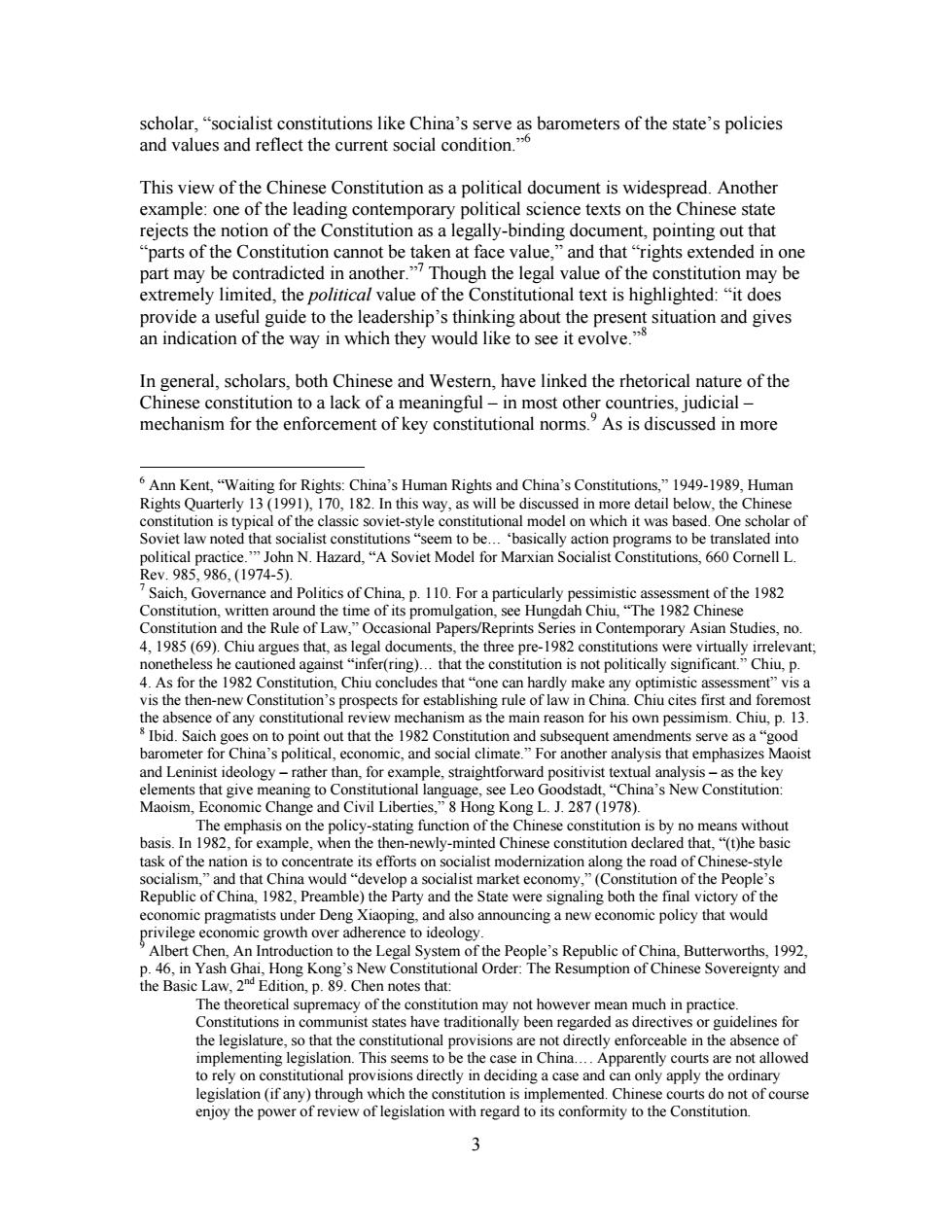
scholar,"socialist constitutions like China's serve as barometers of the state's policies and values and reflect the current social condition." This view of the Chinese Constitution as a political document is widespread.Another example:one of the leading contemporary political science texts on the Chinese state rejects the notion of the Constitution as a legally-binding document,pointing out that "parts of the Constitution cannot be taken at face value,"and that"rights extended in one part may be contradicted in another."7 Though the legal value of the constitution may be extremely limited,the political value of the Constitutional text is highlighted:"it does provide a useful guide to the leadership's thinking about the present situation and gives an indication of the way in which they would like to see it evolve."8 In general,scholars,both Chinese and Western,have linked the rhetorical nature of the Chinese constitution to a lack of a meaningful-in most other countries,judicial- mechanism for the enforcement of key constitutional norms.As is discussed in more 6 Ann Kent,"Waiting for Rights:China's Human Rights and China's Constitutions,"1949-1989,Human Rights Quarterly 13(1991),170,182.In this way,as will be discussed in more detail below,the Chinese constitution is typical of the classic soviet-style constitutional model on which it was based.One scholar of Soviet law noted that socialist constitutions"seem to be...'basically action programs to be translated into political practice.""John N.Hazard,"A Soviet Model for Marxian Socialist Constitutions,660 Cornell L. Rev.985.986.(1974-5). Saich,Governance and Politics of China,p.110.For a particularly pessimistic assessment of the 1982 Constitution,written around the time of its promulgation,see Hungdah Chiu,"The 1982 Chinese Constitution and the Rule of Law,"Occasional Papers/Reprints Series in Contemporary Asian Studies,no. 4,1985(69).Chiu argues that,as legal documents,the three pre-1982 constitutions were virtually irrelevant; nonetheless he cautioned against"infer(ring)...that the constitution is not politically significant."Chiu,p. 4.As for the 1982 Constitution,Chiu concludes that"one can hardly make any optimistic assessment"vis a vis the then-new Constitution's prospects for establishing rule of law in China.Chiu cites first and foremost the absence of any constitutional review mechanism as the main reason for his own pessimism.Chiu,p.13 s Ibid.Saich goes on to point out that the 1982 Constitution and subsequent amendments serve as a"good barometer for China's political,economic,and social climate."For another analysis that emphasizes Maoist and Leninist ideology-rather than,for example,straightforward positivist textual analysis-as the key elements that give meaning to Constitutional language,see Leo Goodstadt,"China's New Constitution: Maoism,Economic Change and Civil Liberties,"8 Hong Kong L.J.287(1978). The emphasis on the policy-stating function of the Chinese constitution is by no means without basis.In 1982,for example,when the then-newly-minted Chinese constitution declared that,"(t)he basic task of the nation is to concentrate its efforts on socialist modernization along the road of Chinese-style socialism,"and that China would"develop a socialist market economy,"(Constitution of the People's Republic of China,1982,Preamble)the Party and the State were signaling both the final victory of the economic pragmatists under Deng Xiaoping,and also announcing a new economic policy that would privilege economic growth over adherence to ideology. Albert Chen,An Introduction to the Legal System of the People's Republic of China,Butterworths,1992 p.46,in Yash Ghai,Hong Kong's New Constitutional Order:The Resumption of Chinese Sovereignty and the Basic Law,2nd Edition,p.89.Chen notes that: The theoretical supremacy of the constitution may not however mean much in practice. Constitutions in communist states have traditionally been regarded as directives or guidelines for the legislature,so that the constitutional provisions are not directly enforceable in the absence of implementing legislation.This seems to be the case in China....Apparently courts are not allowed to rely on constitutional provisions directly in deciding a case and can only apply the ordinary legislation (if any)through which the constitution is implemented.Chinese courts do not of course enjoy the power of review of legislation with regard to its conformity to the Constitution. 3
3 scholar, “socialist constitutions like China’s serve as barometers of the state’s policies and values and reflect the current social condition.”6 This view of the Chinese Constitution as a political document is widespread. Another example: one of the leading contemporary political science texts on the Chinese state rejects the notion of the Constitution as a legally-binding document, pointing out that “parts of the Constitution cannot be taken at face value,” and that “rights extended in one part may be contradicted in another.”7 Though the legal value of the constitution may be extremely limited, the political value of the Constitutional text is highlighted: “it does provide a useful guide to the leadership’s thinking about the present situation and gives an indication of the way in which they would like to see it evolve.”8 In general, scholars, both Chinese and Western, have linked the rhetorical nature of the Chinese constitution to a lack of a meaningful – in most other countries, judicial – mechanism for the enforcement of key constitutional norms.9 As is discussed in more 6 Ann Kent, “Waiting for Rights: China’s Human Rights and China’s Constitutions,” 1949-1989, Human Rights Quarterly 13 (1991), 170, 182. In this way, as will be discussed in more detail below, the Chinese constitution is typical of the classic soviet-style constitutional model on which it was based. One scholar of Soviet law noted that socialist constitutions “seem to be… ‘basically action programs to be translated into political practice.’” John N. Hazard, “A Soviet Model for Marxian Socialist Constitutions, 660 Cornell L. Rev. 985, 986, (1974-5). 7 Saich, Governance and Politics of China, p. 110. For a particularly pessimistic assessment of the 1982 Constitution, written around the time of its promulgation, see Hungdah Chiu, “The 1982 Chinese Constitution and the Rule of Law,” Occasional Papers/Reprints Series in Contemporary Asian Studies, no. 4, 1985 (69). Chiu argues that, as legal documents, the three pre-1982 constitutions were virtually irrelevant; nonetheless he cautioned against “infer(ring)… that the constitution is not politically significant.” Chiu, p. 4. As for the 1982 Constitution, Chiu concludes that “one can hardly make any optimistic assessment” vis a vis the then-new Constitution’s prospects for establishing rule of law in China. Chiu cites first and foremost the absence of any constitutional review mechanism as the main reason for his own pessimism. Chiu, p. 13. 8 Ibid. Saich goes on to point out that the 1982 Constitution and subsequent amendments serve as a “good barometer for China’s political, economic, and social climate.” For another analysis that emphasizes Maoist and Leninist ideology – rather than, for example, straightforward positivist textual analysis – as the key elements that give meaning to Constitutional language, see Leo Goodstadt, “China’s New Constitution: Maoism, Economic Change and Civil Liberties,” 8 Hong Kong L. J. 287 (1978). The emphasis on the policy-stating function of the Chinese constitution is by no means without basis. In 1982, for example, when the then-newly-minted Chinese constitution declared that, “(t)he basic task of the nation is to concentrate its efforts on socialist modernization along the road of Chinese-style socialism,” and that China would “develop a socialist market economy,” (Constitution of the People’s Republic of China, 1982, Preamble) the Party and the State were signaling both the final victory of the economic pragmatists under Deng Xiaoping, and also announcing a new economic policy that would privilege economic growth over adherence to ideology. 9 Albert Chen, An Introduction to the Legal System of the People’s Republic of China, Butterworths, 1992, p. 46, in Yash Ghai, Hong Kong’s New Constitutional Order: The Resumption of Chinese Sovereignty and the Basic Law, 2nd Edition, p. 89. Chen notes that: The theoretical supremacy of the constitution may not however mean much in practice. Constitutions in communist states have traditionally been regarded as directives or guidelines for the legislature, so that the constitutional provisions are not directly enforceable in the absence of implementing legislation. This seems to be the case in China…. Apparently courts are not allowed to rely on constitutional provisions directly in deciding a case and can only apply the ordinary legislation (if any) through which the constitution is implemented. Chinese courts do not of course enjoy the power of review of legislation with regard to its conformity to the Constitution
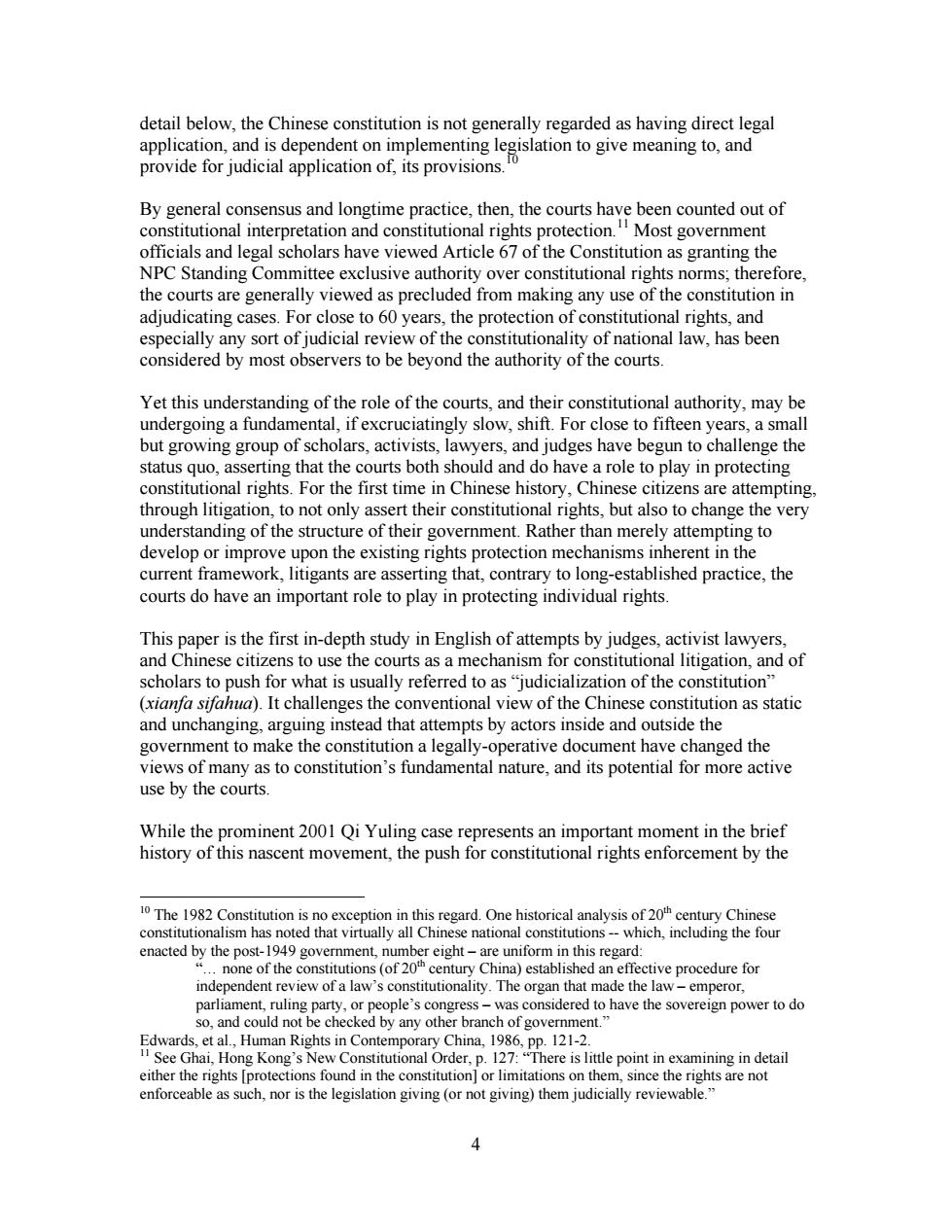
detail below,the Chinese constitution is not generally regarded as having direct legal application,and is dependent on implementing legislation to give meaning to,and provide for judicial application of,its provisions. By general consensus and longtime practice,then,the courts have been counted out of constitutional interpretation and constitutional rights protection.Most government officials and legal scholars have viewed Article 67 of the Constitution as granting the NPC Standing Committee exclusive authority over constitutional rights norms;therefore, the courts are generally viewed as precluded from making any use of the constitution in adjudicating cases.For close to 60 years,the protection of constitutional rights,and especially any sort of judicial review of the constitutionality of national law,has been considered by most observers to be beyond the authority of the courts. Yet this understanding of the role of the courts,and their constitutional authority,may be undergoing a fundamental,if excruciatingly slow,shift.For close to fifteen years,a small but growing group of scholars,activists,lawyers,and judges have begun to challenge the status quo,asserting that the courts both should and do have a role to play in protecting constitutional rights.For the first time in Chinese history,Chinese citizens are attempting through litigation,to not only assert their constitutional rights,but also to change the very understanding of the structure of their government.Rather than merely attempting to develop or improve upon the existing rights protection mechanisms inherent in the current framework,litigants are asserting that,contrary to long-established practice,the courts do have an important role to play in protecting individual rights. This paper is the first in-depth study in English of attempts by judges,activist lawyers, and Chinese citizens to use the courts as a mechanism for constitutional litigation,and of scholars to push for what is usually referred to as "judicialization of the constitution" (xianfa sifahua).It challenges the conventional view of the Chinese constitution as static and unchanging,arguing instead that attempts by actors inside and outside the government to make the constitution a legally-operative document have changed the views of many as to constitution's fundamental nature,and its potential for more active use by the courts. While the prominent 2001 Qi Yuling case represents an important moment in the brief history of this nascent movement,the push for constitutional rights enforcement by the 10The 1982 Constitution is no exception in this regard.One historical analysis of 20h century Chinese constitutionalism has noted that virtually all Chinese national constitutions--which,including the four enacted by the post-1949 government,number eight-are uniform in this regard: .none of the constitutions(of 20th century China)established an effective procedure for independent review of a law's constitutionality.The organ that made the law-emperor, parliament,ruling party,or people's congress-was considered to have the sovereign power to do so,and could not be checked by any other branch of government." Edwards,et al.,Human Rights in Contemporary China,1986,pp.121-2. See Ghai,Hong Kong's New Constitutional Order,p.127:"There is little point in examining in detail either the rights [protections found in the constitution]or limitations on them,since the rights are not enforceable as such,nor is the legislation giving(or not giving)them judicially reviewable." 4
4 detail below, the Chinese constitution is not generally regarded as having direct legal application, and is dependent on implementing legislation to give meaning to, and provide for judicial application of, its provisions.10 By general consensus and longtime practice, then, the courts have been counted out of constitutional interpretation and constitutional rights protection.11 Most government officials and legal scholars have viewed Article 67 of the Constitution as granting the NPC Standing Committee exclusive authority over constitutional rights norms; therefore, the courts are generally viewed as precluded from making any use of the constitution in adjudicating cases. For close to 60 years, the protection of constitutional rights, and especially any sort of judicial review of the constitutionality of national law, has been considered by most observers to be beyond the authority of the courts. Yet this understanding of the role of the courts, and their constitutional authority, may be undergoing a fundamental, if excruciatingly slow, shift. For close to fifteen years, a small but growing group of scholars, activists, lawyers, and judges have begun to challenge the status quo, asserting that the courts both should and do have a role to play in protecting constitutional rights. For the first time in Chinese history, Chinese citizens are attempting, through litigation, to not only assert their constitutional rights, but also to change the very understanding of the structure of their government. Rather than merely attempting to develop or improve upon the existing rights protection mechanisms inherent in the current framework, litigants are asserting that, contrary to long-established practice, the courts do have an important role to play in protecting individual rights. This paper is the first in-depth study in English of attempts by judges, activist lawyers, and Chinese citizens to use the courts as a mechanism for constitutional litigation, and of scholars to push for what is usually referred to as “judicialization of the constitution” (xianfa sifahua). It challenges the conventional view of the Chinese constitution as static and unchanging, arguing instead that attempts by actors inside and outside the government to make the constitution a legally-operative document have changed the views of many as to constitution’s fundamental nature, and its potential for more active use by the courts. While the prominent 2001 Qi Yuling case represents an important moment in the brief history of this nascent movement, the push for constitutional rights enforcement by the 10 The 1982 Constitution is no exception in this regard. One historical analysis of 20th century Chinese constitutionalism has noted that virtually all Chinese national constitutions -- which, including the four enacted by the post-1949 government, number eight – are uniform in this regard: “… none of the constitutions (of 20th century China) established an effective procedure for independent review of a law’s constitutionality. The organ that made the law – emperor, parliament, ruling party, or people’s congress – was considered to have the sovereign power to do so, and could not be checked by any other branch of government.” Edwards, et al., Human Rights in Contemporary China, 1986, pp. 121-2. 11 See Ghai, Hong Kong’s New Constitutional Order, p. 127: “There is little point in examining in detail either the rights [protections found in the constitution] or limitations on them, since the rights are not enforceable as such, nor is the legislation giving (or not giving) them judicially reviewable